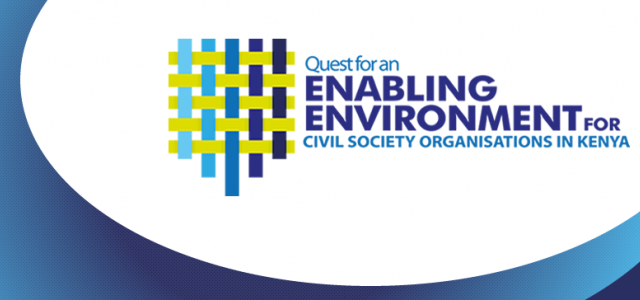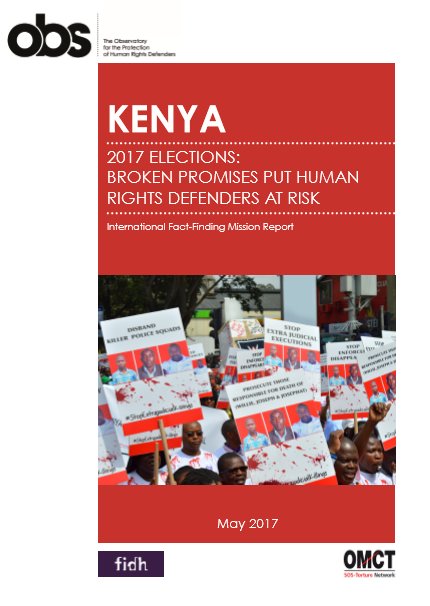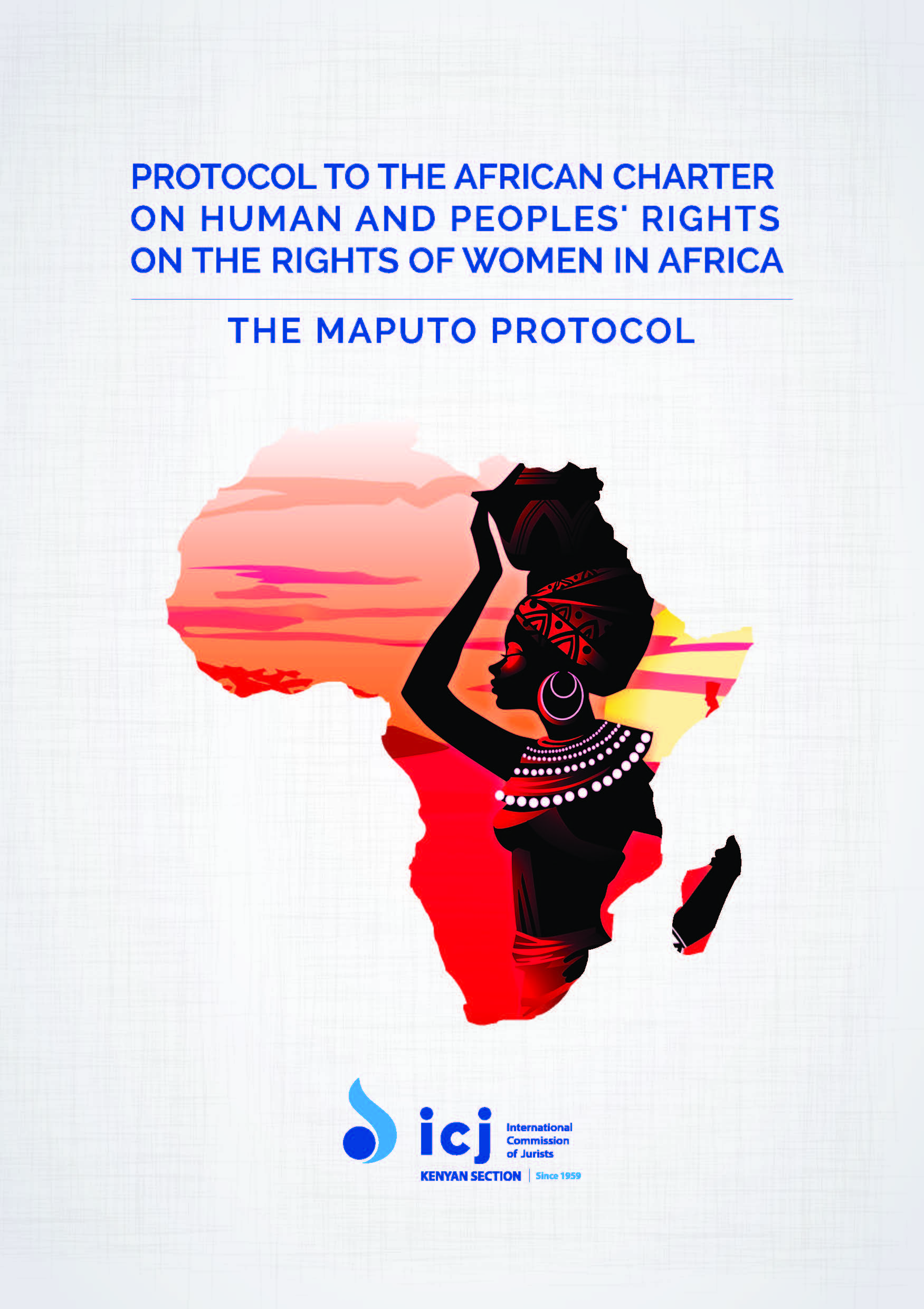Geneva-Paris,Nairobi May 18, 2017 – “The latest High Court ruling on the commencement of the 2013 Public Benefit Organisations Act (PBO Act), eagerly awaited by Kenyan civil society for more than four years, is a welcome sign from the judiciary, two weeks after the publication of our report”, said the Observatory for the Protection of Human Rights Defenders today.
On May 13, 2017, Nairobi High Court judge Mativo ordered the Interior Cabinet Secretary, Mr. Joseph Nkaissery, to publish in the Gazette within the next 30 days, the commencement date of the Public Benefit Organisation (PBO) Act 2013[1]. The judge declared that the Kenyan government was clearly in contempt of court over its failure to comply with a similar ruling eight months ago. However, the judge decided to give it a last chance to the government to implement the before taking legal measures.
Last week’s court order was not the first. It followed a similar ruling issued on October 31, 2016, by another High Court judge, Louis Onguto, which gave 14 days to the Cabinet Secretary for Devolution and Planning, Mr. Mwangi Kiunjuri, at that time in charge of the regulation of the civil society sector, to commence the PBO Act[2]. On September 9, 2016, Mr. Kiunjuri had already given notice of commencement of the PBO Act, putting the hopes of Kenyan civil society high again after years of waiting. However, after the ruling, no further development followed, and instead, the control of the non-governmental sector was moved under the portfolio of the Ministry of Interior, rendering the Court order inapplicable.
“Such a manœuvre clearly aims at escaping the High Court order and at neutralising the goodwill expressed by the Cabinet Secretary for Devolution and Planning. This is very worrying, particularly in a democratic State claiming to uphold the rule of law” declared Mr. Gerald Staberock, OMCT Secretary General. “It shows the level of arbitrariness exercised by the Kenyan government to control civil society and the blatant disrespect of the Executive for the judiciary”, he added.
This second High Court ruling, which was, as the previous one, triggered by civil society legal action trying to hold the Kenyan government accountable for its inaction, was originally scheduled on March 15, 2017. However, the several failures by the three respondents, the Cabinet Secretary for Devolution and Planning, the Ministry of Interior and the Attorney General, to file their response, forced Justice Mativo to postpone the case until May 23, 2017. Finally, to avoid further delays and not wait until the physical hearing at the end of May, counsel for the applicants and the respondents were asked to make written submissions since, according to the judge, the matter was quite straight forward.
“After more than four years of inaction the Kenyan authorities should operationalise without any further delay the PBO Act 2013, and put an end to any form of arbitrariness and abuses against Kenyan civil society”, said FIDH Vice-President, Ms. Sheila Nabashwa.
The PBO Act 2013 is a law seeking to provide a more enabling environment for NGOs, with clear criteria regarding NGOs’ registration, enhanced accountability, set timelines for processing applications, as well as tax incentives and benefits for organisations conducting “public benefit activities”. It was passed by the Parliament in 2012 and signed into law by the then President Mwai Kibakion January 14, 2013,but has not been operationalised yet under the Kenyatta administration, while several attempts have been made to introduce new restrictive amendments prior to its official commencement.
On May 3, 2017, the Observatory published an international fact-finding mission report entitled “Kenya: 2017 elections: broken promises put human rights defenders at risk”, which provides a series of recommendations addressed to the authorities to improve the space for civil society engaged in the promotion and protection of human rights, among which the call for the immediate operationalization of the PBO Act 2013[3].
The Observatory for the Protection of Human Rights Defenders (the Observatory) was created in 1997 by FIDH and OMCT. The objective of this programme is to prevent or remedy situations of repression against human rights defenders. FIDH and OMCT are both members of ProtectDefenders.eu, the European Union Human Rights Defenders Mechanism implemented by international civil society.
For more information, please contact:
Moses Okinyi – Nairobi +254726989713
OMCT: Chiara Cosentino: +41 228 09 49 37
FIDH: Samuel Hanryon: +33 6 72 28 42 94 / Audrey Couprie: +33 6 48 05 91 57
[1] The PBO Act is available on: http://pboact.or.ke/resources/documents/category/3-legislation.
[2] See the Observatory Press Release issued on November 4, 2016.
[3] See the Observatory Press Release issued on May 3, 2017.
Home Private: News KENYA: Last warning from the court to implement the PBO Act 2013 within 30 days

KENYA: Last warning from the court to implement the PBO Act 2013 within 30 days
May 18, 2017
3 minute read
Related Posts
Implement Universal Healthcare Free of Graft
Our Constitution, under Article 43, recognises the fundamental right to the highest attainable standard of health. It is…
September 29, 2023
Hon. Justice Professor Joel Ngugi receives the 2022 Jurist of the Year Award (JOYA)
ICJ Kenya is happy to announce that the 2022 Jurist of the Year Award (JOYA) recipient. To a…
December 10, 2022
Gender Mainstreaming and Climate Change
By Julie Matheka 1.0 Introduction Gender mainstreaming was acknowledged as an indispensable strategy for achieving gender equality at…
October 18, 2022
Newsletter Issue 1 Of 2022 is now out!
Dear reader, Welcome to the first edition of our 2022 Newsletter. We have some significant developments to share…
May 19, 2022










